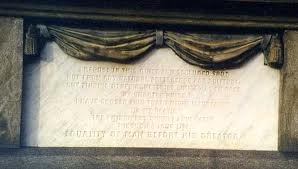Thaddeus Stevens, Speaking Fire From The Grave
Thaddeus Stevens died on 11th August, 1868. Inscribed on his tombstone were the words: "I repose in this quiet and secluded spot, not from any natural preference for solitude; but finding other cemeteries limited as to race, by charter rules, I have chosen this that I might illustrate in my death the principles which I advocated through a long life, equality of man before the Creator".
Last night, after getting both delighted and decimated by some Chicken Vindaloo at The Himalayan restaurant in Lancaster--to be fair I asked for it to be hot--me and my companions walked through the Celebrate Lancaster crowds back to where our cars were parked.
One of our companions for the night was a Chica couch-surfing from California. She suggested to calm the heat from the food that we stop for some drinks at a local watering hole. Kind of fight fire with fire, I suppose. It actually worked. Like giving Ritalin (a form of Speed) to hyperactive children to calm them down.
Speaking of fire, when we returned to the car, we were captivated by the fireworks downtown. We were about 8 blocks West on King St. and spent the next 20 minutes or so being entertained by the pyrotechnics. And speaking of pyrotechnics, we came to the graveyard where Thaddeus Stevens, the Lancastrian anti-slavery Congressman around the Civil War, is buried. He was the most resolute politician in the U.S. government opposing slavery whose life is portrayed in the new Lincoln film.
Here are some firework pyrotechnic quotes (he had much harsher words for his enemies):
“There can be no fanatics in the cause of genuine liberty. Fanaticism is excessive zeal. There may be, and have been fanatics in false religion – in the bloody religions of the heathen. There are fanatics in superstition. But there can be no fanatic, however warm their zeal, in the true religion, even although you sell your goods and bestow your money on the poor, and go on and follow your Master. There may, and every hour shows around me, fanatics in the cause of false liberty – that infamous liberty which justifies human bondage, that liberty whose ‘corner-stone is slavery.’ But there can be no fanaticism however high the enthusiasm, in the cause of rational, universal liberty – the liberty of
the Declaration of Independence.” – June 10, 1850.
“I wish the Indians had newspapers of their own. If they had, you would have horrible pictures of the cold-blooded murders of inoffensive Indians. You would have more terrible pictures than we have now revealed to us [of white people], and, I have no doubt, we would have the real reasons for these Indian troubles. I suppose they would be as accurate as those you have in the letters which have just been read, and which have come in here so opportunely.” – April 19, 1860
“I have done what I deemed best for humanity. It is easy to protect the interests of the rich and powerful. But it is a great labor to protect the interests of the poor and downtrodden. It is the eternal labor of Sisyphus, forever to be renewed. I know how unprofitable is all such toil. But he who is earnest heeds not such things. It has not been popular. But if there be anything for which I have entire indifference; perhaps I might say contempt, it is the public opinion which is founded on popular clamor.”
"My sands are nearly run, and I can only see with the eye of faith. I am fast descending the downhill of life, at the foot of which stands an open grave. But you, sir, are promised length of days and a brilliant career. If you and your compeers can fling away ambition and realize that every human being, however lowly-born or degraded, by fortune is your equal, that every inalienable right which belongs to you belongs also to him, truth and righteousness will spread over the land, and you will look down from the top of the Rocky Mountains upon an empire of one hundred millions of happy people." -- July 7, 1868, as part of presentation on impeachment resolution after Johnson had been acquitted.
It makes me proud to be from Lancaster. Thaddeus Stevens, a flawed man who fought for the rights of all, in both his life and death.



Comments